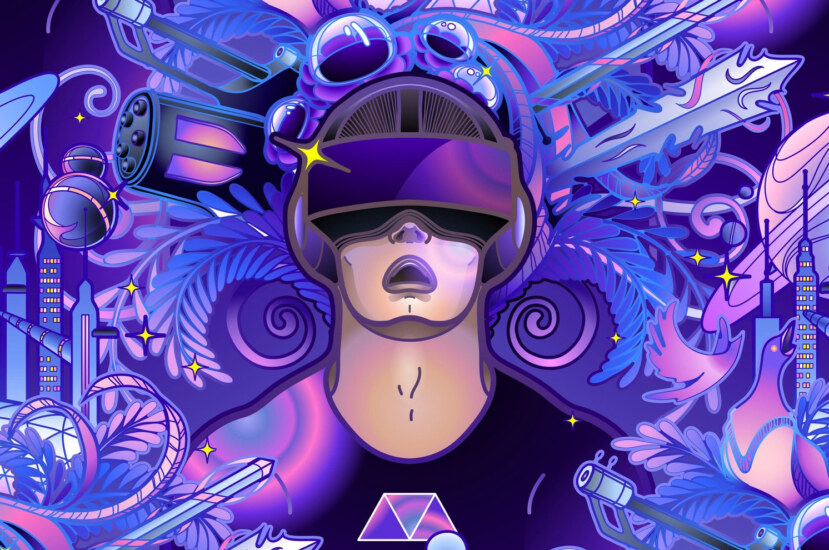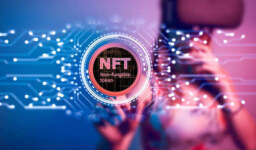The internet is evolving day by day. This is creating new and more advanced technologies which can expand it beyond the current devices. One such technology is the metaverse. Till now the Internet we are using is limited to a 2D landscape but with the help of metaverse, it will stretch beyond this scope with minimal usage of the existing hardware. This is made possible with the help of augmented and virtual reality along with blockchain.
The Origin of Metaverse:
The word metaverse is a compilation of the Greek word Meta which means beyond and verse which is a short form of the universe. Although the word was coined by Neal Stephenson in his 1992 novel Snow Crash. The term became popular when Mark Zuckerberg announced that he is renaming his company ‘Facebook’ to ‘Meta’ as he wants to change the perception of the company from a social media site to a more connected entity. The metaverse also closely resembles the novel “Ready Player One” which fictions the world in 2045. The metaverse will be based on the Internet and is claimed to be highly interactive.
Till now the users only browsed the Internet, but metaverse will make the people live in it. There is only one thing that users can claim on today’s Internet which is the domain name. Metaverse creates possibilities for individuals to work, travel, shop, host events, and much more. The user can also buy property using cryptocurrencies. The reader must be thinking it is a distant phenomenon, but it is happening as Barbados has set up its digital embassy in the metaverse. Recently, some singers have hosted their events on this platform which were attended live by millions of their fans.
Components of the Metaverse:
Virtual Reality:
Virtual reality is a technology that mimics the real-world experience through the use of specialized hardware and software. This is possible through a Virtual reality headset such as HTC Vive, Oculus Rift, etc. The headset has built-in gyroscopes and motion sensors to detect the movement of the hand and the body. This technology is popular in the military, education, medicine, and entertainment.
Augmented Reality:
This technology brings out virtual objects into the actual world as if they are present in reality. It uses the camera of the device for superimposing virtual objects, and we all have heard the name Pokémon Go which made this technology more popular. Thus, AR is a heavy contributor to the development of the metaverse and its global market is predicted to reach 160 billion $.
Blockchain:
A blockchain maintains data in the form of a digital ledger. A digital ledger lists the transactions in duplicated and distributed form and is hence called a Distributed Ledger Technology (DLT). It is the basis of all cryptocurrencies and can’t be faked. This will help in creating ownership regulations in the metaverse.
NFT:
This entity is gaining momentum, especially among the artists as they can now claim the uniqueness of their product digitally. NFTs use blockchain to identify a digital item that cannot be modified. These are termed as non-fungible as they are not interchangeable – a person cannot exchange his/her creation for another. Thus, every NFT on the internet has an owner. The use of NFT and metaverse will create limitless business opportunities. These NFTs will serve as a certificate of ownership to virtual property. It will also help in accessing the events hosted on the metaverse thus creating a more sustainable economy on the metaverse
5G:
The Fifth Generation of mobile networks is here to connect people around the globe and can support modern technologies such as the Internet of Things (IoT) and Artificial Intelligence. This technology is 10 to 100 times faster than 4G and can revolutionize experience in the metaverse as heavy data usage and reliability of the network will be a key aspect in the operation and management of the metaverse.
Artificial Intelligence:
The use of AI has brought technology to a whole new level and its applications are extensive – Defense, Automobiles, Healthcare, Education, etc. are being transformed with the help of AI. Embedding human-like capabilities in computer systems through the use of mathematical models, probability, and neural networks also solves complex problems that were mysteries hitherto. The developers of Artificial Intelligence are working in the field of assistive technologies, games, intensive processes, and making machine-human interaction easier.
These components and technologies exist at present but are in the development phase and are scattered so, to create the metaverse, the tech giants are working on creating a bridge between them. Once the platform is fully operational it will help in reducing the lacunae between the physical and the virtual world. The user can interact through verbal and nonverbal gestures without the application of today’s hardware such as a mouse, keyboard, and touchscreen. Each individual can choose his/her digital identity known as an avatar and create a virtual world of his/her choice. This sounds like Euphoria, doesn’t it? We can do everything well other than eating but it is claimed that this is the future of the Internet and embarking on this paradigm is essential both for the individual as well as the company.
Current Scenario of the Metaverse:
The top-level tech giants are working relentlessly in this domain and expanding their investments as they consider it a potential source of both revenue and data. Apart from these organizations, many non-tech companies which develop day-to-day consumer products are also upgrading themselves for this platform. Nike, the global apparel brand, announced the acquisition of RTFKT studios which deals in virtual shoes based on the NFTs for the metaverse. Every industry is gearing up for harnessing the potential of the 8 trillion $ market of this new platform as per a report by Goldman Sachs. Let’s discuss how the major tech industries are preparing for the next version of the Internet:
Facebook:
That’s the company that created the buzz around the word metaverse by renaming itself Meta and its plan to invest over 7 billion $ in the development of this platform. Mark Zuckerberg also announced that the company wants to focus on creating jobs in the developing countries and bring more users by bringing the price of the Oculus VR headset to $1, a company acquired by the social media platform in 2014.
Microsoft:
Bill Gates predicts that as a development toward the metaverse most virtual meetings will move from the two-dimensional rectangular boxes to the metaverse. The company has its gaming platform and hardware – the Xbox as well as the HoloLens- a mixed reality-based device. A communication platform called Mesh by MS for virtual collaboration has tilted the odds in favor of the Redmond giant as compared to Facebook or Meta as they say.
ALPHABET:
The use of VR and AR reminds us of Google Glass a 2014 project under the name X development that failed but after learning from its past the company is ready and using its expertise in the Artificial Intelligence and AR domain. Besides, it is worth noting that the developer of Oculus Mark Lukovsky is at Google and heading the augmented reality team. So the absence of the search engine leader even in this domain is inevitable.
Apple:
The metaverse will feel incomplete without the contribution of the innovator and the flagship brand. Although Apple currently has no AR/VR product, its announcement of investing in the metaverse up ticked the shares by over 23%. Although some reports say that the metaverse is contradictory to the company’s privacy policies and hence it might tread slowly in this direction.
Roadblocks to the metaverse:
Privacy:
Metaverse although highly interactive will allow tracking of every movement of an individual and this can prove detrimental as there will be no such option of “disabling or enabling cookies”. The companies can use this data for polarization as we have seen in the last few years, especially in the case of Facebook.
Health:
The current accessibility of metaverse is via a headset which is quite bulky and creates motion sickness or eye stress. Recently, a gamer developed spinal cracks because of the long hour usage of the VR headset. So whether its current application can be proved on the professional front is debatable.
Security:
Blockchains and NFTs are the fundamentals of the metaverse, but their reliability has been a matter of research among various organizations and even countries. Besides, there always lies a scenario of ethical behavior whenever virtual existence comes into the picture.
Cost-effective:
Since the metaverse is a global platform risen out of the Internet and the connectivity is dynamic from country to country, creating a metaverse will need a cost-effective and highly efficient Internet connection for every individual.
Final Verdict:
The Themetaverse’s degree of interactivity depends on how closely the virtual world resembles the actual environment. The use of augmented reality and virtual reality is limited to a few organizations around the world, so it is too early to decide whether it will be accepted as the advanced version of the Internet. Everything has its own merits and demerits but some issues such as privacy and connectivity can help clear the path for its successful implementation.
FAQs:
Q1: What is the requirement of the metaverse?
Ans: The metaverse needs a high-speed internet connection and a headset like Oculus or Hololens.
Q2: Is metaverse centralized or decentralized?
Ans: It depends from company to company, some say Meta (Facebook) will be decentralized and will not need a Facebook account to log in.
Q3: Are there any moderation and security policies?
Ans: Experts say yes but what will they be and who will govern them is still in the works. Probably, they will be similar to the existing policies that govern the Internet.










The way you described it, is Incredible. I like the article.